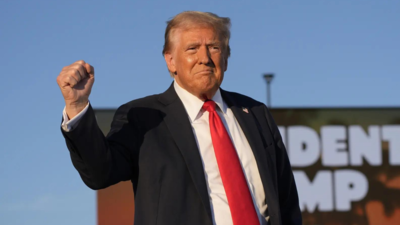
The results of one of the biggest elections are just around the corner. The United States is about to welcome a new president. Who will it be? The Republican candidate Donald Trump, who served as president from 2017 to 2021, or the Democratic candidate Kamala Harris, the current vice president? The world is set to witness the final showdown, with election results scheduled to be announced on November 5.Regardless of the outcome, significant changes are expected in American politics and various sectors, including education.
Today, we will try to find an answer to one significant yet less-discussed question: What will happen to the education system if Donald Trump becomes president again? Of late, the former president has made various statements regarding the country’s education system, including the controversial proposal to shut down the Department of Education.
The Shutdown of the Education Department
Donald Trump has reignited the debate over shutting down the U.S. Department of Education (DoE), advocating for a transfer of educational authority back to the states. This isn’t a new idea; he proposed similar notions during his 2016 campaign. While the idea of dismantling the DoE has gained traction among some conservatives, the feasibility of such a move remains uncertain.
Trump argues that the U.S. education system ranks poorly compared to other developed nations. He believes that individual states could manage education more effectively and at a lower cost if given full control. For conservatives like him, education should be managed locally, as the U.S. Constitution does not explicitly define a federal role in this area. Critics of the DoE contend that it has overreached under Democratic administrations, citing issues like civil rights enforcement, student discipline policies, and protections for LGBTQ students.
If Trump is re-elected, it is anticipated that his administration will work towards removing the DoE and granting more power to the states in education matters.
Student Debt Waiver
Another pressing topic in the current debate is the escalating student debt crisis, alongside President Joe Biden and Vice President Kamala Harris’s plans to forgive education loans for millions. The United States is grappling with an unprecedented student debt crisis, as rising tuition costs compel an increasing number of students to rely on loans to finance their education.
In response, President Biden announced initiatives aimed at providing student debt relief. One of his key promises during the 2020 campaign was to alleviate the student debt burden. However, his efforts have faced significant legal challenges, most notably the Supreme Court’s rejection of his sweeping proposal to forgive the debt of over 40 million borrowers.
During a debate with Kamala Harris on September 9, Donald Trump highlighted the issue of student loans, referencing the Supreme Court’s decision to block Biden’s loan forgiveness plan. Trump has consistently criticized the Biden administration for what he describes as misleading college graduates with promises of loan cancellation. He praised the Supreme Court’s ruling, arguing that it would have been “very unfair to millions of people who have paid their debts through hard work.”
If Trump is elected, it is highly likely that his administration would take steps to weaken or even repeal various student loan forgiveness programs.
Teaching About Racial Theory, Sexuality, Gender, and the Transgender Debate
One of the most contentious topics in current discussions is, “What is the appropriate age for students to learn about sexuality and gender?” Reports indicate that while many teachers, students, and parents agree that schools should address discussions about racism, opinions on LGBTQ+ topics are mixed. Some educators believe discussions on gender identity are crucial, while others argue that such topics should not be included in the school curriculum.
Donald Trump has stated that his administration would eliminate what he refers to as “critical race theory.” This theory is an intellectual and social movement that provides a framework for legal analysis based on the premise that race is not a natural, biologically grounded feature of distinct human subgroups but rather a socially constructed category used to oppress and exploit people of color. According to The Economic Times, if Trump is elected, one of his first actions could be to cut federal funding for schools teaching critical race theory. However, since federal funding to schools is tied to laws enacted by Congress, implementing this change would likely require legislative support, making it a challenging promise to fulfill quickly.
When it comes to teaching about sexuality and gender, Trump appears to adopt a conservative stance. Although he has not specified an age at which students should be taught about these topics, he has pledged to cut federal funding to schools that promote what he describes as “transgender insanity.” During his presidency, he rolled back protections that allowed transgender students to use school bathrooms aligned with their gender identity. At a 2022 campaign rally, he stated that he would “ban men from women’s sports,” explicitly referring to barring transgender women from competing in women’s sports. Additionally, recent media reports indicate that Trump has suggested he would take executive action to ban transgender athletes from participating in sports aligned with their gender identity.
If Trump is re-elected, it is expected that he will first work to cut federal funding for schools teaching critical race theory and will also ensure that transgender women cannot participate in women’s sports.
Ready to lead with AI? Enroll now with GrowFast to transform your business strategy. Click here!

